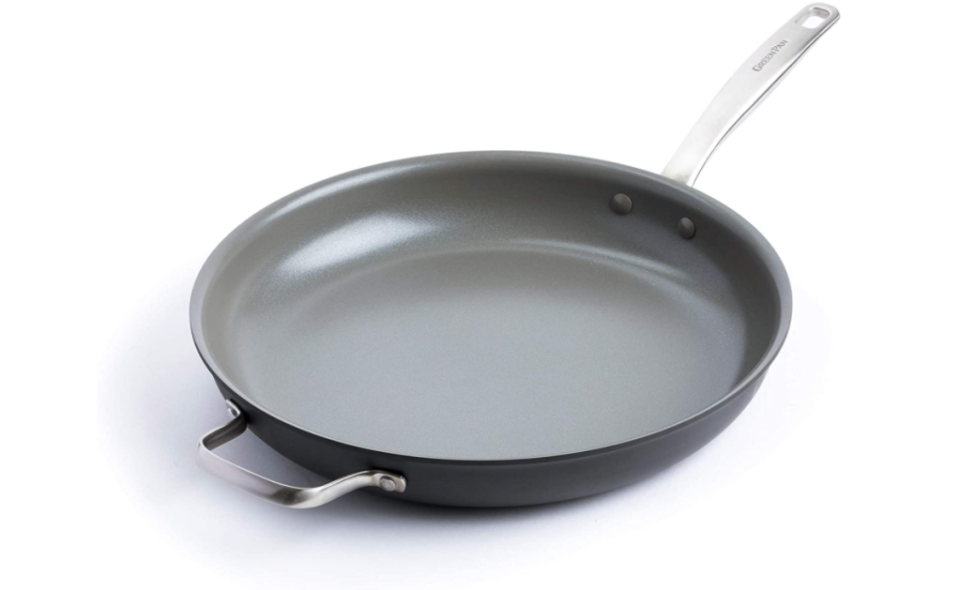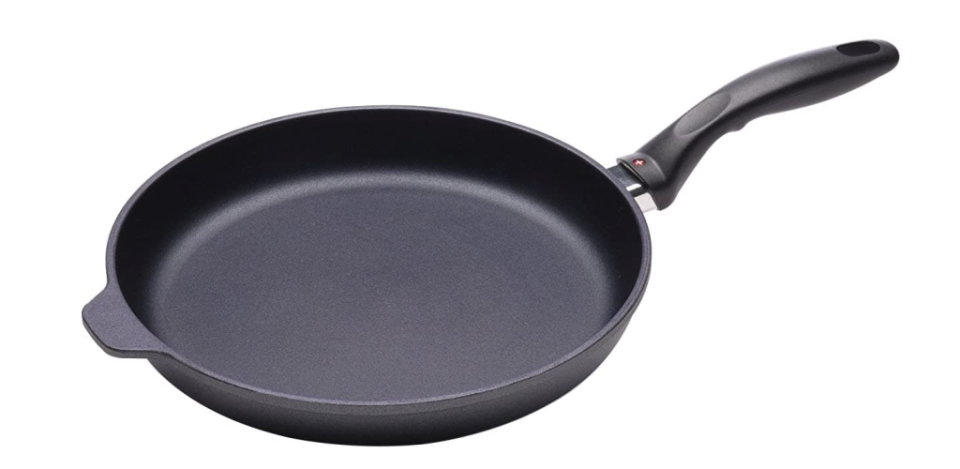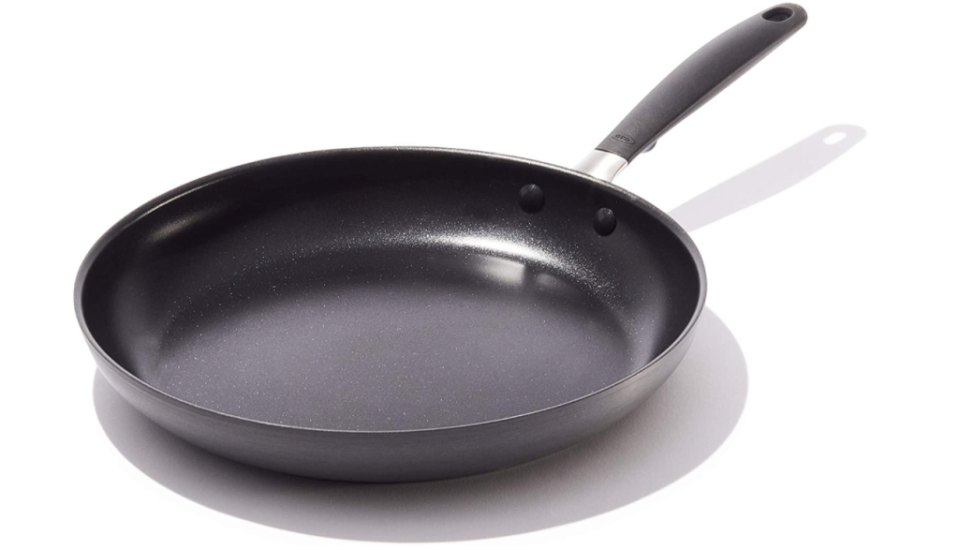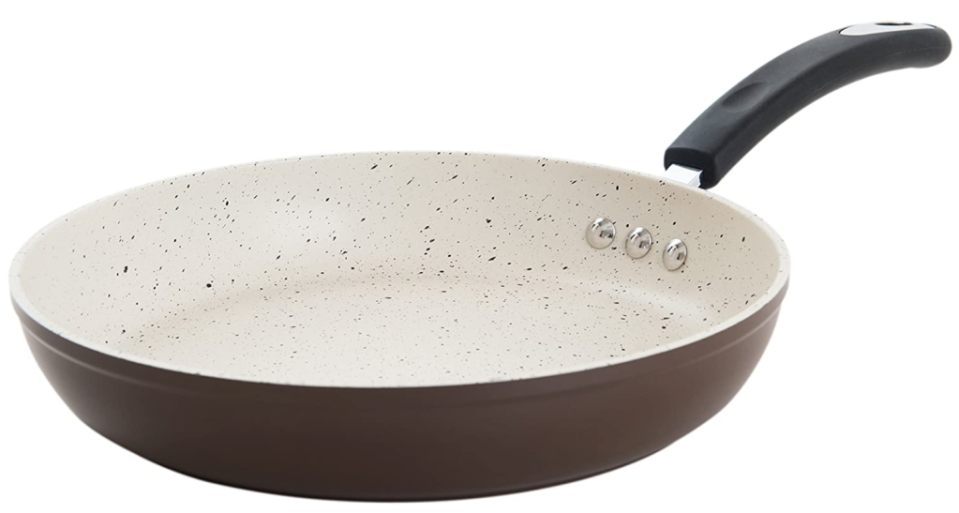RS Recommends: Here’s Why It’s Time to Switch to Non-Toxic Cookware

If you purchase an independently reviewed product or service through a link on our website, Rolling Stone may receive an affiliate commission.
Teflon cookware has been in the news (again) recently, highlighting the possible health concerns over the chemicals inside and the harmful effect from using them. Fortunately, cookware companies have started crafting their pots and pans with teflon alternatives and derivatives, which still offer the super-convenient non-stick coating with less risk to your health.
More from Rolling Stone
Non-Toxic Cookware Buying Guide: Teflon vs. Ceramic
For nonstick pans, the two most common choices are teflon and ceramic, but there are still other excellent options out there to complete your kitchen set without sacrificing on quality. Here’s our brief breakdown of what to know when looking for your next piece of non-toxic cookware.
Teflon can contain PFOAs (Perfluorooctanoic acid), but more recently, manufacturers have switched to PTFE (Polytetrafluoroethylene), which is thought to be a safer alternative and still does a nice job of retaining the heat. Teflon pans can’t handle extreme temperatures though, up to and around 500o is when you may start to get toxic fumes. Same goes for scratches, as small dings and dents aren’t going to be a big deal, but a major scrape from a metal cooking tool is what breaks that seal and releases chemicals into the pan each time you cook (which is why to always use silicon or wood utensils when cooking with teflon).
For teflon pans, go for one with a thick aluminum core; otherwise a thin one will heat unevenly and inconsistently. When this happens, you get some spots that are blazing hot and others that lag behind, a huge hurdle when trying to cook.
Ceramic has been a welcome alternative to teflon among chefs, and is made from sand with no toxic chemicals – safe from scratching and overheating. However, they can be chipped, form cracks, sometimes so small they’re microscopic, which affects its ability to be nonstick. They also have a shorter life than teflon, wearing out faster. Ceramic pans are generally made from metal with a coating on top, though 100% ceramic ones are an option too. They also gets hotter, faster, and even at a medium-high heat can burn food.
While both or their nonstick coatings will eventually wear off, teflon lasts significantly longer. But they’re not the only options out there – other materials like cast iron (enamel), stainless steel, and carbon steel might be a better fit for your kitchen and cooking habits.
Cast iron pans can last decades. When properly cared for, there’s a good chance you’ll be passing it down to your grandchildren. They distribute heat evenly, can be used on the stovetop and in the oven, and are affordable for the amount of use you get out of it. The downside? When not properly cared for, cooking anything remotely sticky is a time-consuming mess. When food comes into direct contact with the pan’s iron (the iron itself isn’t toxic, and in fact is actually great for people with an iron deficiency), removing it can be a chore. It also requires a lot more maintenance in general, like seasoning, conditioning, and oiling to keep it up, while avoiding anything too acidic like tomatoes and lemons. You also shouldn’t use soap on it when cleaning, as it can get absorbed and strip the coating even further. Getting a cast iron pan with enamel coating brings the benefit of non-stickiness with a lot of the positives and longevity of the cast iron.
Carbon steel pans may seem too sticky at first, but keep using it, and you’ll notice that after seasoning and cooking with it, they can actually be even less sticky than teflon. Just like cast iron though, it takes some work to get there. When properly cared for, just like the cast iron, these will last a lifetime, and they can go in the oven too. They’re 99% iron and behave in the same way: the more you use it, the better the nonstick coating you create.
Stainless steel pans can get expensive, and aren’t great for sticky foods, but even the best nonstick coated cookware fades over time, and will need to be replaced eventually.
Other factors like weight matter too. Cast iron pans are heavy, and not great for jostling and maneuvering, slipping and sliding. Carbon steel is lighter and offers a lot of the same benefits as a cast iron, whereas an average teflon-based pan should weigh under five pounds.
What’s the Best Non-Toxic Cookware?
We rounded up some of the best non-toxic cookware that you can buy online right now.
Caraway Nonstick Ceramic Cookware Set (12 Piece)
After weeks of cooking multiple meals with this 12-piece set from Caraway, the pots and pans still looked brand new. The surface is coated in a safe and superbly non-stick coating that not only looks aesthetically clean and pleasing, but is easier to wash and requires less butter and oil when preparing food. The coating is completely free of PTFE, PFOA, PFAS, lead, cadmium and other toxic materials that have been known to find their way into food, making them safe for you and your family, and also for the over, able to withstand temperatures rising to 550oF.
We tested these on a gas stove with excellent results, but they work just as well on electric and even induction stovetops too. When you’re done, the set conveniently comes with 4 modular magnetic pan racks and a canvas lid holder to keep everything neat and organized until your next meal.
Amazon
Caraway Nonstick Ceramic Cookware Set (12 Piece)
1. GreenPan Chatham Frying Pan/Skillet
This diamond-infused, ceramic-coated pan is free of PFOA, PFAS, lead and cadmium, and can withstand an intense 600oF in the oven. It's also one of the rare pans we found that's dishwasher-friendly, and is safe to use with metal utensils too.
The tough, anodized aluminum body holds up to rough treatment, and the edges allow for easy pouring without making a big mess.

GreenPan Chatham Frying Pan/Skillet
2. Swiss Diamond Nonstick Fry Pan
Swiss Diamond's nonstick fry pan is PFOA-free. The coating here is PTFE, reinforced with real, durable diamond crystals, and it's not just a novelty thing either – users found diamonds can be a better heat conductor than metal, and this performed well against sticky foods, even when cooking without oil.
The cast aluminum can handle oven heat up to an impressive 500oF, and it still weighs in at under three pounds.

Swiss Diamond Nonstick Fry Pan
3. OXO Good Grips Nonstick Frying Pan
OXO makes a ton of household products that we've tested over the years and always been satisfied with and this non-toxic pan is no exception.
The build quality on this pan is solid and sturdy, with a tough anodized body that heats evenly and holds up against light scratches. The handle stays cool even when the stovetop heat is turned up, and at under three pounds, it's still easy to move around.

OXO Good Grips Nonstick Frying Pan
4. Ozeri Stone Earth Frying Pan
The stone-derived coating on this pan is free of PFOAs as well as a host of other potentially harmful chemicals, while still being non-stick and scratch-resistant.
The aluminum base distributes heat evenly, even on induction stoves, with a depth of two inches and a handle that's comfortable to hold when cooking.

Ozeri Stone Earth Frying Pan
5. Ninja Foodi NeverStick PossiblePot
Made from aluminum and stainless steel (and without PFOAs, cadmium, and lead), the Possible Pot acts as up to 12 different cooking tools, including a stock pot, serving dish, and strainer just to name a few.
This holds 7 quarts, is oven-safe up to 500oF just like a cast iron, and works on all cooktops. In our tests, the heat was evenly distributed while cooking (and retained as well), and it's easy to maneuver it around at just over five pounds.
The pan includes a stainless steel roasting rack, 10.25-inch glass lid, and an integrated detachable spoon too. When you're done, it's safe to put in the dishwasher, and the coating is designed to not chip or flake away.
Ninja Foodi NeverStick PossiblePot
Best of Rolling Stone
Click here to see more up-to-date holiday deals!